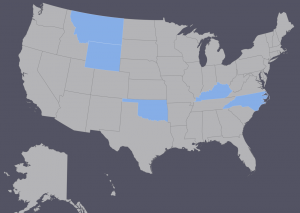The Legal Encroachments By The Federal Government Upon State Domain We Should All Care About
The principle of states' rights has of course been utilized as a pretext for ignoble purposes. That doesn’t make every intrusion by the federal government a noble endeavor though.
 I understand that not everyone might have the same respect for arguments regarding states’ rights, but I also have to notice “both sides” invoke the principles of federalism quite regularly in two important areas:
I understand that not everyone might have the same respect for arguments regarding states’ rights, but I also have to notice “both sides” invoke the principles of federalism quite regularly in two important areas:
- State Police Power
A state’s police powers represent a fundamental right of state power granted by the Constitution. Traditionally, attempts at federal encroachment to circumvent state police powers has been condemned by legal conservatives. It was the celebrated conservative Supreme Court Justice Antonin Scalia who in Printz v. United States declared the federal government could not require “local police to assist in the enforcement of federal gun control law.” The political “catch,” so to speak, regarding that legal decision is that the same concept can be applied to federal immigration law, and that is how you get sanctuary cities. It is also where you can probably begin to understand how the same state police power can produce both liberal and conservative champions.

Legal AI: 3 Steps Law Firms Should Take Now
Despite past instances of grand defense by both “sides,” however, threats to state police power remain. For example, the federal policy known as “adoption” is a program where federal agencies are allowed to “circumvent state restrictions on asset seizures” by collaborating with state police and prosecutors. The adoption program was abandoned during the last presidency out of a claimed respect for federalism but was reinstituted by the current administration’s Department of Justice. With the observable electoral state push in recent years to reform civil asset forfeiture — to require a conviction before seizure for example, something federal law does not require — the reinstitution of the federal adoption program represents a gross intrusion upon state police power. The residents of those states should expect their nonelected state officers to uphold their laws. When the federal government provides gross incentivization for state officers to circumvent the law, faithfulness to state law, and thus respect to state power, is severely undermined.
This intrusion by the adoption program is made altogether worse by the fact that the feds (along with pretty much everybody else), have a terrible track record of abuse and targeting of innocents when it comes to such property seizures. Publications such as Reason have long “detailed numerous cases of people whose cars, money, and even homes were seized for petty drug crimes or, in some cases, just for having large amounts of cash on hand.” In fact, the state shift toward reforming civil asset forfeiture is driven in part by these records of abuses.
As teased above, another example of federal encroachment on state police power does in fact involve enforcement of federal immigration laws. As Damon Root of Reason explained, the federal government has sued the State of California over the California Values Act of 2017 and has asked the U.S. Supreme Court to hear the case. However, again because of the Printz precedent, on the merits the federal government should lose. After all, as Root explains:
“The same logic that applied in Printz would seem to apply equally well in U.S. v. California. If it’s unconstitutional for the feds to commandeer the states into enforcing a federal gun control scheme, it’s also unconstitutional for the feds to commandeer the states into enforcing federal immigration policy.”
Sponsored

Legal AI: 3 Steps Law Firms Should Take Now

Early Adopters Of Legal AI Gaining Competitive Edge In Marketplace

The Business Case For AI At Your Law Firm


Navigating Financial Success by Avoiding Common Pitfalls and Maximizing Firm Performance
It remains to be seen whether this Printz doctrine will have another champion to defend it against another federal encroachment.
- Religious Liberty
I apologize to anyone who may be sick of me discussing this topic. Maybe the reason I continually return to it is because, like others, I am simply a glutton for punishment. But I would also be remiss if I did not include this subject. Because one the most egregious proposed infringements of federal power over the states is happening right now in the Montana Department of Revenue v. Espinoza case. The facts are quite simple, the Supreme Court has held that states have the right to strengthen Establishment Clause liberty with state-specific statutes if they so choose. Moreover, even the petitioners in the Espinoza case acknowledged during oral argument that as a function of this Establishment Clause liberty, states can choose not to fund secular and religious private schools entirely. Now, you and everyone else can read right here and see that this is exactly what the Montana Supreme Court did. In 1972, during its state constitutional convention, public hearings were held in the Montana on the subject of religious liberty. Voices at the time, among whom the religious were most prominent, expressed the desire to avoid state funding of religious schools in Montana as a means to protect against state control over religious education. In accordance with these wishes, the 1972 Montana state constitutional convention adopted a “no aid” provision into its state constitution.
Accordingly, if you are a statutory or constitutional originalist, who respects state sovereignty and legislative authority, the Espinoza case should be a relatively straightforward case of the application of a recognized state liberty. However, what we are seeing from both political and legal voices in describing the Espinoza case is nothing short of incredible. According to some, the Montana Supreme Court is guilty of upholding a bigot-inspired religious discrimination by the state. To this astounding portrayal I am forced to repeat that both parties agree the Montana Supreme Court in its decision treated secular and religious private schools the same. That the record clearly illustrates the Montana State Constitutional Convention of 1972 erased its old Blaine Amendment-type system by starting “all over again.” To characterize what the Montana Supreme Court did in upholding the will of its 1972 state convention as though it is upholding a nineteenth-century Blaine Amendment-inspired form of bigotry should be journalistic/legal malpractice. Yet, during oral argument, members on the U.S. Supreme Court asked questions comparing what Montana was upholding to racial discrimination. The lesson here is that state power will always need a worthy champion.
Sponsored

Is The Future Of Law Distributed? Lessons From The Tech Adoption Curve

Navigating Financial Success by Avoiding Common Pitfalls and Maximizing Firm Performance
 Tyler Broker’s work has been published in the Gonzaga Law Review, the Albany Law Review, and is forthcoming in the University of Memphis Law Review. Feel free to email him or follow him on Twitter to discuss his column.
Tyler Broker’s work has been published in the Gonzaga Law Review, the Albany Law Review, and is forthcoming in the University of Memphis Law Review. Feel free to email him or follow him on Twitter to discuss his column.







